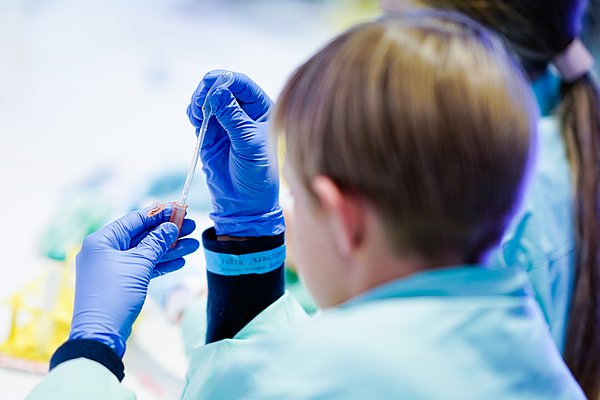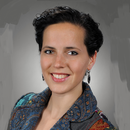The Hopp Children’s Cancer Center Heidelberg (KiTZ) is a joint institution of the German Cancer Research Center (DKFZ), Heidelberg University Hospital (UKHD) and the University of Heidelberg (Uni HD).
Developing cancer therapies specifically for children is one of the major challenges in cancer research. An estimated 400,000 children and adolescents worldwide are diagnosed with cancer* every year. In countries with high medical standards such as Germany, around 80 percent of these children can be cured with the therapies currently available. In other countries, the cure rate is 60 percent or less.
“Unfortunately, standard therapies and new targeted medications for adults do not help a large proportion of these children,” says Stefan Pfister, director at the Hopp Children’s Cancer Center Heidelberg (KiTZ), head of department at the German Cancer Research Center (DKFZ) and pediatric oncologist at the Heidelberg University Hospital (UKHD). “Cancer in children has other causes, the types of cancer are different and we also see clear differences in tumor biology that cannot simply be transferred from adult oncology to children.”
Cancer Grand Challenges is a global funding initiative co-founded by Cancer Research UK and the National Cancer Institute in the US. From the original 176 applications received, five teams have now been selected to receive funding of up to $25 million each over five years. The PROTECT team is funded by Cancer Research UK, the National Cancer Institute, the Scientific Foundation of the Spanish Association Against Cancer and KiKa (Children Cancer Free Foundation) through Cancer Grand Challenges.
“We are overjoyed that PROTECT is one of the selected projects,” says Stefan Pfister, who leads the project together with his team and the research groups of Frank Westermann, Ana Banito and Florencia Cidre-Aranaz at KiTZ and DKFZ. “Bringing new treatment approaches into clinical development takes years and the costs from development through preclinical testing to early clinical trials run into the millions. For most pharmaceutical companies, the market in pediatric oncology is too small, so specific developments for children are not even attempted. Without strong financial support, such as that made possible by Cancer Grand Challenges specifically for academic cancer research, the development of new therapeutic approaches in children would not be possible for cancer research institutes.”
The international project, involving nine of the world's leading cancer research centers from Spain, France, the USA, the Netherlands, the UK and Germany, together with patient representatives and the self-financed non-profit organization LifeArc, takes an approach that has not yet been taken in pediatric oncology: cancer driving proteins should be marked with specifically designed molecules for their targeted degradation and then broken down by the cell's own machinery. This new type of therapy is called PROTACs and “molecular glues”.
Therapies with PROTACS and molecular glues are already being tested in clinical studies in adult oncology, but have hardly been researched for childhood cancers.
In PROTECT, the leading research institutes in medicinal chemistry, tumor biology and clinical cancer research have come together to be able to carry out the entire process themselves, from the chemical development of molecular active ingredients to biological validation and preclinical testing on tumor models developed specifically for childhood cancer. The interdisciplinary project is led by Stefan Pfister, Nathanael Gray from Stanford University and Kimberly Stegmaier from the Dana-Farber Cancer Institute in Boston. In close cooperation with the KiTZ spin-off ITCC-P4 gGmbH, the drugs are to be tested on laboratory models specifically for childhood tumor diseases.
“Theoretically, we can use this process to force the breakdown of every conceivable cancer protein in the tumor cells,” explains Pfister. “This means we can specifically break down tumor proteins that were previously considered untouchable – for example, because their structure makes it impossible to block them with medication,” says Pfister. “Another advantage is that these drugs can have a positive effect on cellular immunotherapies, which have unfortunately only been successful in a few children so far. Through the targeted protein breakdown, the immune cells that are supposed to attack the tumor cells can be switched on and off and therefore, do not tire so quickly.”
In the next five years, the research team will focus on childhood tumors for which the chances of recovery are comparatively poor. These include, among others, brain tumors, neuroblastomas and bone and soft tissue tumors in children. The scientists have already identified 12 cancer proteins as particularly promising weak points in these tumors, for some of which the first chemical substances have already been developed. It is now being systematically examined whether the tumors can be successfully combated with the new approach in the laboratory and also in the clinical setting.
“We are very pleased that Cancer Grand Challenges has placed a special focus on pediatric oncology this time. PROTECT is one of two childhood cancer research projects that now have the opportunity to work closely together to sustainably improve the situation for children and young people with cancer,” says Pfister.
*WHO: www.who.int/news-room/fact-sheets/detail/cancer-in-children
About Cancer Grand Challenges
Co-founded in 2020 by two of the largest funders of cancer research in the world, Cancer Research UK and the National Cancer Institute, Cancer Grand Challenges supports a global community of diverse, world-class research teams to come together, think differently and take on some of cancer’s toughest challenges. These are the obstacles that continue to impede progress and no one scientist, institution or country will be able to solve them alone. With awards of up to $25M, Cancer Grand Challenges teams are empowered to rise above the traditional boundaries of geography and discipline to make the progress against cancer we urgently need. Cancer Grand Challenges now brings together 1,200 researchers and 16 teams from across the world to take on 13 challenges.




